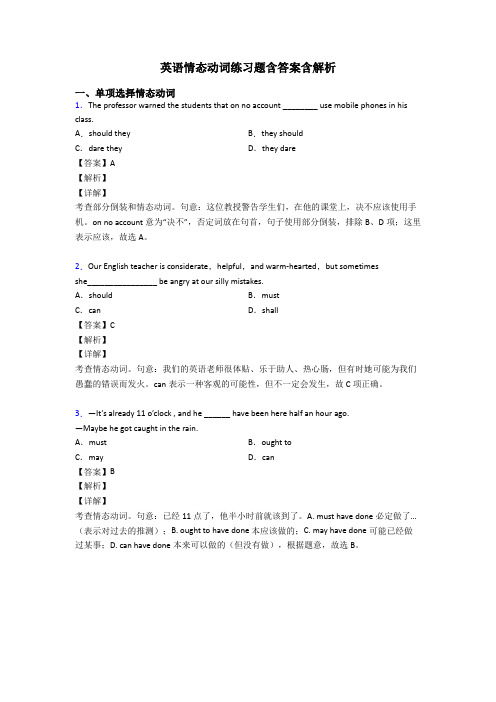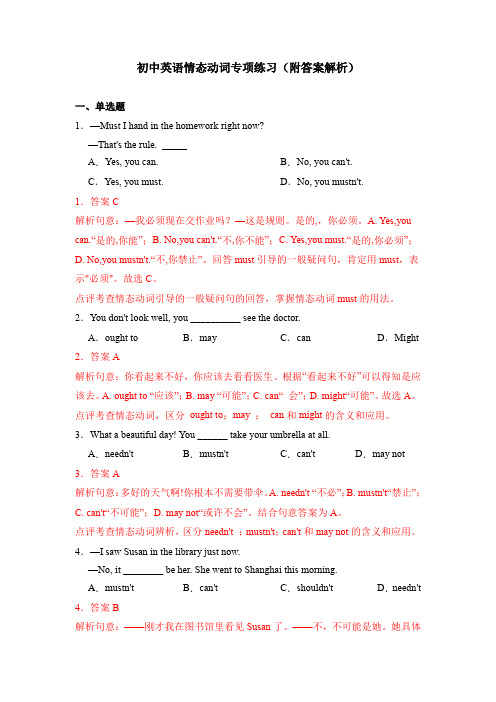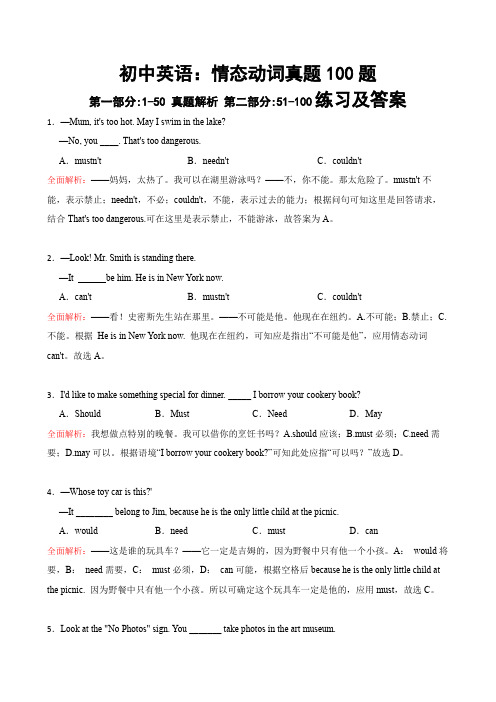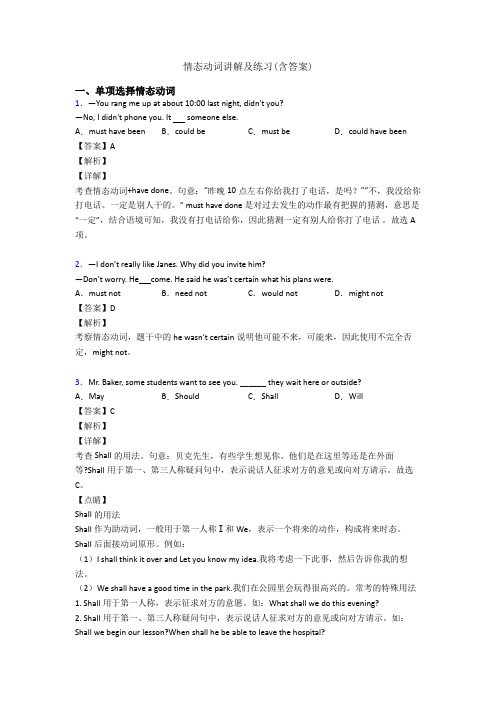初中英语情态动词讲解练习和答案解析
英语情态动词练习题含答案含解析

【点睛】
would的用法
1.would最常见的用法是:相对于一个过去时间点的后来“将要”做什么,比如:He said he would meet me at the station.他说他会在车站接我的。这句中的would meet是相对于said(过去说)之后要做的事情。又如:She thought she would have to ask someone for help.她当时想,她得找个人帮忙。
4.Mark ______ have hurried. After driving at top speed, he arrived half an hour early.
A.needn’tB.wouldn’tC.mustn’tD.couldn’t
【答案】A
【解析】
考查情态动词。need’t have done本不必要做某事,句意:迈克本不必要着急的。他以全速驾驶后,他早到了半个小时。wouldn’t不会,mustn’t禁止,couldn’t不可能,所以选A。
【答案】A
【解析】
【详解】
考查部分倒装和情态动词。句意:这位教授警告学生们,在他的课堂上,决不应该使用手机。on no account意为“决不”,否定词放在句首,句子使用部分倒装,排除B、D项;这里表示应该,故选A。
2.Our English teacher is considerate,helpful,and warm-hearted,but sometimes she________________ be angry at our silly mistakes.
八年级上英语常用语法知识——情态动词(答案解析)

一、选择题1.It's raining._______an umbrella with you when you go out.A.Takes B.Take C.Taking D.Took B解析:B【解析】【详解】句意:下雨了,当你出去的时候,随身携带一把雨伞。
考查祈使句。
take携带,根据所给空后面的when you go out可知,应该用的是祈使句,祈使句肯定形式的构成:动词原形放在句首,故选B。
2.Please ________ to take your homework to school.A.don’t forget B.not forget C.not to forget D.forget not to A解析:A【解析】【详解】句意:请不要忘记把你的作业带去学校。
根据句意“不要忘记把你的作业带去学校”可知使用否定祈使句,结构为don't+动词原形。
please用在祈使句中可以表示一种客气的语气,故答案选A。
3.—When and where shall we meet tomorrow?—Let’s _______ it 3:00 p. m. at my ho me.A.do B.make C.meet D.plan B解析:B【解析】试题分析:句意:--我们明天什么时候在哪见面。
--让我们下午三点在家见面。
A做 B制作C见面 D计划;make it 制定时间。
故选B.考点:考查动词的用法。
4.Peter, ______ more if you want to get high scores in the P.E. test next month.A.practiceB.practicesC.practicingD.will practice A解析:A【解析】【详解】句意:彼得,如果你想在下个月体育测试中获得高分,那就多加练习。
动词practice意为“练习”,选项A为原形,选项B是三单形式,选项C是ing形式;选项D是一般将来时形式;本题考查祈使句的用法,祈使句动词原形开头,故选A。
初中英语情态动词专项练习(附答案解析)

初中英语情态动词专项练习(附答案解析)一、单选题1.—Must I hand in the homework right now?—That's the rule.A.Yes, you can.B.No, you can't.C.Yes, you must.D.No, you mustn't.1.答案C解析句意:—我必须现在交作业吗?—这是规则。
是的,,你必须。
A. Yes,you can.“是的,你能”;B. No,you can't.“不,你不能”;C. Yes,you must.“是的,你必须”;D. No,you mustn't.“不,你禁止”。
回答must引导的一般疑问句,肯定用must,表示"必须"。
故选C。
点评考查情态动词引导的一般疑问句的回答,掌握情态动词must的用法。
2.You don't look well, you __________ see the doctor.A.ought to B.may C.can D.Might 2.答案A解析句意:你看起来不好,你应该去看看医生。
根据“看起来不好”可以得知是应该去。
A. ought to “应该”;B. may “可能”;C. can“ 会”;D. might“可能”。
故选A。
点评考查情态动词,区分ought to;may ;can和might的含义和应用。
3.What a beautiful day! You ______ take your umbrella at all.A.needn't B.mustn't C.can't D.may not 3.答案A解析句意:多好的天气啊!你根本不需要带伞。
A. needn't “不必”;B. mustn't“禁止”;C. can't“不可能”;D. may not“或许不会”。
全面解析初中英语情态动词100例与答案

初中英语:情态动词真题100题第一部分:1-50 真题解析第二部分:51-100练习及答案1.—Mum, it's too hot. May I swim in the lake?—No, you ____. That's too dangerous.A.mustn't B.needn't C.couldn't全面解析:——妈妈,太热了。
我可以在湖里游泳吗?——不,你不能。
那太危险了。
mustn't不能,表示禁止;needn't,不必;couldn't,不能,表示过去的能力;根据问句可知这里是回答请求,结合That's too dangerous.可在这里是表示禁止,不能游泳,故答案为A。
2.—Look! Mr. Smith is standing there.—It be him. He is in New York now.A.can't B.mustn't C.couldn't全面解析:——看!史密斯先生站在那里。
——不可能是他。
他现在在纽约。
A.不可能;B.禁止;C.不能。
根据He is in New York now. 他现在在纽约,可知应是指出“不可能是他”,应用情态动词can't。
故选A。
3.I'd like to make something special for dinner. _____ I borrow your cookery book?A.Should B.Must C.Need D.May全面解析:我想做点特别的晚餐。
我可以借你的烹饪书吗?A.should应该;B.must必须;C.need需要;D.may可以。
根据语境“I borrow your cookery book?”可知此处应指“可以吗?”故选D。
4.—Whose toy car is this?'—It ________ belong to Jim, because he is the only little child at the picnic.A.would B.need C.must D.can全面解析:——这是谁的玩具车?——它一定是吉姆的,因为野餐中只有他一个小孩。
初三下册英语情态动词专项练习(含答案和解析)含解析

初三下册英语情态动词专项练习(含答案和解析)含解析一、选择题1.—I prefer western food. It’s delicious and good for us.—_______ ? But western food is said to be high in sugar and fat.A.Is that right B.How do you know thatC.Do you really think so D.Who told you that2.—Are you going to offer some masks and alcohol wet wipes (酒精湿巾) to the people in the village?—________ They are in great need of these things.A.What a shame! B.Why not? C.Why me? D.What's wrong? 3.—I just got a message from Ms. Yang and she said she would come to our meeting this afternoon.— She always has good ideas.A.Why not? B.What a pity! C.Time is up. D.That’ll be very nice. 4.—Don’t forget to keep safe distance (距离) at least one meter, Mike!—________A.Sorry, I won’t.B.No, I can’t do it.C.Not at all. D.I hope not. 5.—The game is too hard for me. I will certainly lose.—________. You should never say no before you try.A.Forget it! B.Come on! C.I’m sorry.D.Pardon me? 6.—I’m afraid I can’t find the key to the car.—______. I’ll wait for you. We have e nough time.A.Hurry up B.All rightC.It is up to you D.Hold your horses7.— I find it difficult to fall asleep before exams. Could you help me?— ___________. We have helped many students with similar problems.A.No problem B.Come on C.Well done D.What a pity 8.—________.—It’s a pleasure.A.Don’t worry about the task B.Thank you for showing me aroundC.Be careful when you travel D.You’d better get up now9.—I thought I’d try to repair the car myself.— __________ ! You know nothing about the car.A.No way B.You can’t be serious C.I couldn’t agree more D.Don’t change a thing10.—I’m afraid I can’t do well in the sports meeting. I might let my classmates down.—_______. You don’t need to push yourself too hard.A.It’s a pleasure B.What a pity C.Take it easy D.You’re welcome 11.--Would you like to go shopping with me on Saturday?-- . I have to help my mother with housework.A.I’m afraid not B.Take your timeC.Enjoy yourself D.That’s all right12.—Another Friday! Let’s go to see the play tonight.—________ I will book the tickets online.A.My pleasure. B.That’s right.C.Why not? D.Never mind. 13.—It’s been a wonderful party. Thank you very much?—- ________________.A.With pleasure B.No , thanks C.It’s OK D.I’m glad you enjoyed it .14.— Are you feeling any better now after taking the medicine?—________. I’m feeling even worse.A.You got it B.Never mind C.Sorry to hear that D.Quite the opposite 15.— Could you please clean your room?—_________. I’ll do it at once.A.Yes, sure B.Sorry, I can’t C.It doesn’t matter D.Here you are 16.— What do you think of the movie Mr. Bea ?—____. It’s very funny.A.I can’t stand it .B.I don’t mind it C.I love it. D.I hate it. 17.—Would you like a small or a large bowl of noodles? —_______. I’m very hungry.A.A small bowl B.A large bowl C.Yes, please D.No, thanks 18.-Do you mind telling me how to use this function? - . It’s easy. Just double-click on the “Pencil” icon.A.No, not at all B.Of course, I doC.Yes, I do D.Yes, I don’t19.—Would you please help me with my spoken English?—__________. First you should know practice makes perfect.A.That’s right B.No problem C.Quite well D.No, thanks 20.—Lucy, can you help me with my history?—________. I am good at it.A.With pleasure B.I’m afraid not C.Sorry, I can’t D.No way 21.—Sir, this is your order, two chicken hamburgers and a cup of coffee. ________—I’ll have them here.A.For here or to go? B.Something to drink? C.Anything else? D.Is that OK? 22.—Why not take your son to watch the new film A Little Red Flower?—__________.A.Good idea B.No problem C.Good luck D.No way 23.—You seem so happy today, Jack.—________? I won the first prize in the singing competition yesterday.A.So what B.How come C.Guess what D.Why not 24.—________. Where’s the nearest supermarket?—Oh, it’s about 300 meters away, next to a park.A.Thank you B.Excuse me C.Come on D.That’s OK 25.—I’m sorry. That wasn’t of much help.— ________. In fact, it was most helpful.A.Thanks anyway B.It doesn’t matter C.Of course not D.Sure it was 26.—I wonder if Tenny is doing well in her new school.—________. She is old enough to look after herself well.A.You’re welcome B.Good luck C.It’s a pity D.No need to worry 27.—Can you tell me how to get to the park?—________—Thank you all the same.A.Show me the map, please.B.Certainly. It’s opposite the museum.C.Sorry, I don’t know. I’m a stranger here.D.Sure. Turn right and go along Rock Road.28.—How would you like your soup?—________.A.Very delicious B.With some tomatoes and eggs, pleaseC.I like it very much D.No, thanks29.—Don’t keep the water running when you brush your teeth.— ________ .A.I hope so B.I’m afraid not C.Sorry, I won’t D.It’s nothing 30.—How do you find the documentary DA VID Profile(国宝档案).—________. I can’t think too highly of it.A.It all depends B.It’s really wonderfulC.No one knows for certain D.It is not my cup of tea31.—I find it really unwise to go travelling during May Day holiday.—________! Wherever you go, it’s crowded with cars and people.A.Not exactly B.Forget it C.You said it D.It depends 32.— Why will you take part in the charity walk? You are not good at running at all.— ________. I run to show that I can help others.A.Not exactly B.That’s not the point C.I can’t agree more D.It sounds like a pity 33.—Shall we go to the amusement park right away or the day after tomorrow?—________. Any time will do.A.Excuse me B.Have a good timeC.It’s up to you D.I’m afraid I can’t34.—How do you like coffee, Minnie?—It tastes very terrible. ________.A.I have no idea B.I don’t mind i t C.I really can’t stand it D.I can’t afford it 35.— Mike, are you ready for the coming final exam?— ________. I have prepared it for weeks.A.You bet B.No deal C.Bad luck D.Have fun 36.— Do you think Steve will pass the exam this time?— ________! He spends most of his time playing games on the phone.A.Promise B.No way C.Well done D.No problem 37.—Can I look at the menu for a few more minutes before I decide?—Of course. ________, Sir.A.Make yourself at home B.Enjoy yourself C.It doesn’t matterD.Take your time38.—How about putting some pictures into the report?—________ A picture is worth a thousand words.A.I don’t think so.B.Why not?C.Thank you. D.Don’t mention it.39.—Why don’t you join in a club to practise speaking English?—________.A.That’s a good idea B.Never mind C.Yes, please D.Thank you 40.—Many people think women are better at cooking than men.—________. Most top chefs in the world are men.A.I agree B.I can’t agree more C.Not at all D.That’s not the case 41.—I’ll be away on a business trip. Would you mind looking after my cat?—Not at all. ________.A.It’s my pleasure B.I’d rather not.C.I’d like it.D.With pleasure. 42.—Thank you for helping to build hospitals during this special period.— ________ ! Many hands make light work.A.My pleasure B.All right C.Never mind D.None of my business43.—I prefer to chat online. I’ve got to know many friends on the Internet.—________. Few of them would become your real friends.A.I can’t agree more B.I’m pleased to know thatC.That’s for sure D.T hat’s not the case44.—I visited the Purple Mountain Observatory by myself last Saturday.—________ Why didn’t you tell me earlier?A.You did? B.I hope not. C.Have a good time. D.I can’t believe it. 45.—Do you think you could finish this project without help?—________. This is not the first time for me.A.Take care B.Don’t worry C.Not exactly D.Hurry up 46.—Mum, Joe has broken a cup!—________. Accidents always happen.A.Pretty good B.Of course C.It doesn’t matter D.That depends 47.—We’ll study in different schools next term. I hope you’ll enjoy your time in the new school!—________A.I’ll take your advice. B.The same to you. C.Congratulations!D.It doesn’t matter.48.— The movie Lost in Russia sends a message about the importance of family.— ________. It reminds me of my parents.A.I hope so B.That’s all right C.You bet D.I don’t think so 49.— The dress I got is not the same color as that is shown online.—________? But if so, I promise we will send you another one.A.How come B.Who knows C.What for D.Why worry 50.—________!—Yes. It sounds gentle and relaxing.A.How good the vegetable soup is B.How exciting the storybook isC.What nice music Ann is playing D.What a beautiful flower Jim keeps【参考答案】***试卷处理标记,请不要删除一、选择题1.C【详解】句意:——我更喜欢西餐。
情态动词讲解及练习(含答案)

情态动词讲解及练习(含答案)一、单项选择情态动词1.—You rang me up at about 10:00 last night, didn't you?—No, I didn't phone you. It someone else.A.must have been B.could be C.must be D.could have been 【答案】A【解析】【详解】考查情态动词+have done。
句意:“昨晚10点左右你给我打了电话,是吗?”“不,我没给你打电话。
一定是别人干的。
” must have done 是对过去发生的动作最有把握的猜测,意思是“一定”,结合语境可知,我没有打电话给你,因此猜测一定有别人给你打了电话。
故选A 项。
2.—I don’t really like Janes. Why did you invite him?—Don’t worry. He come. He said he was’t certain what his plans were.A.must not B.need not C.would not D.might not【答案】D【解析】考察情态动词,题干中的he wasn’t certain说明他可能不来,可能来,因此使用不完全否定,might not。
3.Mr. Baker, some students want to see you. ______ they wait here or outside?A.May B.Should C.Shall D.Will【答案】C【解析】【详解】考查Shall的用法。
句意:贝克先生,有些学生想见你。
他们是在这里等还是在外面等?Shall用于第一、第三人称疑问句中,表示说话人征求对方的意见或向对方请示。
故选C。
【点睛】Shall的用法Shall作为助动词,一般用于第一人称Ⅰ和We,表示一个将来的动作,构成将来时态。
初一情态动词讲解及练习附答案
(could), may (might), must, have to, shall (should, will (would), dare (dared), need (needed), ought to等。
情态动词无人称和数的变化;不能单独使用,必须与其后的动词原形构成谓语一、can, could1) 表示能力(体力、知识、技能)。
Can you lift this heavy box?(体力)Mary can speak three languages.(知识)Can you skate?(技能)此时可用be able to代替。
Can只有一般现在时和一般过去式;而be able to则有更多的时态。
I’ll not be able to come this afternoon.当表示“经过努力才得以做成功某事”时应用be able to,不能用Can。
如:He was able to go to the party yesterday evening in spite of the heavy rain.2) 表示请求和允许。
-----Can I go now? ----- Yes, you can. / No, you can’t. 此时可与may互换。
在疑问句中还可用could, might代替,不是过去式,只是语气更委婉,不能用于肯定句和答语中。
---- Could I come to see you tomorrow? ---- Yes, you can. ( No, I’m afraid not. )3) 表示客观可能性(客观原因形成的能力)。
They’ve changed the timetable, so we can go by bus instead. This hall can hold 500 people at least.4) 表示推测(惊讶、怀疑、不相信的态度),用于疑问句、否定句和感叹句中。
(必考题)初中英语常用语法知识——情态动词习题(答案解析)
一、选择题1.Summer is coming. Please______ play near the river, It's very dangerous.A.can't B.no C.don't C解析:C【解析】【详解】句意:夏天要来了,请不要在河附近玩耍,它很危险。
考查祈使句的否定形式。
can't不可能;no不;don't不,根据祈使句否定形式的构成是:1、Don't+动词原形;2、No+动名词/名词,由所给空后面的play可知,应该用don't,故选C。
2.Mike, __________ make any noise, your father is sleeping.A.not B.don't C.won't D.can't B解析:B【解析】【详解】句意:麦克,不要吵闹,你父亲正在睡觉。
考查祈使句。
A. not 不,没有;B. don’t 不,没有;C. won’t 将不会;D. can’t 不能,不会。
A 选项为否定词;B选项为助动词,后面要接动词;C选项为助动词,将来时表将来;D选项为情态动词,表否定推测。
根据否定祈使句用法,应用助动词don’t + 动词原形结构。
A、C、D均不符合,故应选B。
3.---Be careful, don’t forget to follow your father.---I know that, Mum. One can never be too careful.A.and B.or C.but D.so A解析:A【解析】试题分析:and和,并且;or或者,否则;but但是;so因此。
句意:小心,并且不要忘了跟着你的父亲。
——我知道,妈妈。
一个人不可能永远太过小心。
故选A。
考点:连词辨析点评:连词在句子中主要起联系上下文的作用,他们之间的区别就是表示逻辑关系的不同,所以在解题时先要理解上下文含义,然后根据上下文逻辑关系选择合适的连词。
情态动词练习题(含答案)1
情态动词练习题(含答案)1一、初中英语情态动词1.—He be in the classroom,I think.—No, he be in the classroom. I saw him go home a minute ago.A. can; may notB. must; may notC. may; mustn'tD. may; can't【答案】 D【解析】【分析】句意:——我认为他可能在教室里。
——不,他肯定没有在教室里,我刚才看到他回家了。
must,can(could),may(might)可以表示猜测,must表示肯定猜测,用于肯定句,肯定……一定……;can't表示否定猜测,肯定不……,另外can(could),may (might),表示可能性猜测,可能……根据I think,可知把握较小,根据I saw him go home a minute ago.可知第二句把握大,故选D。
2.—Where is Monica? I can't find her anywhere.—She be in the library. She loves reading books when she is free.A. mustB. needC. can't【答案】 A【解析】【分析】句意:——莫妮卡在哪?我到处都找不到她。
——她肯定在图书馆,她喜欢空闲时看书。
A肯定,肯定句中表示推测,B需要,C不可能,否定句中表示推测,根据 She loves reading books when she is free ,可知是肯定句表示推测,故选A。
【点评】考查情态动词,注意情态动词表推测的用法。
3.We __________ pay to get into the concert. It's free.A. can'tB. mustn'tC. might notD. don't have to【答案】 D【解析】【分析】句意:我们进入音乐会不必付钱。
100例全面解析初中英语情态动词专项练习与答案
初中英语:情态动词真题100题第一部分:1-50 真题解析第二部分:51-100练习及答案1.—Mommy, may I go swimming now?—Yes, honey, but remember that you _____go with your Daddy.A.must B.may C.would D.can全面解析:——妈妈,我现在可以去游泳了吗?——是的,亲爱的,但记住你必须和你爸爸一起去。
must必须;may可以,可能;would将会;can能;根据yes和转折词but,可知是可以去但必须跟爸爸一起,must符合题意,故答案为A。
2.— Whose notebook is this?— It _______________ Bill's. It has his name on it.A.can't be B.must be C.can be D.mustn't be全面解析:——这是谁的笔记本?——一定是比尔的。
can't be不可能是,表示否定的推测;must be 一定是;can be可以是,可能;上面有他的名字。
mustn't be 不能;根据It has his name on it. 上面有他的名字,可知,这个笔记本一定是吉姆的,表示肯定的推测,故答案为B。
3.—____________ you call back tomorrow?— Of course I can.A.Can B.Must C.May D.Need全面解析:——你能明天再打来吗?——我当然可以。
can,可以;must,必须;may,可以,主语常用第一人称;need,必须。
都是情态动词。
从答语中can知,问句也用can。
故选A。
4.— Two hundred yuan for such a T-shirt! You ___________________ be joking!— I'm not joking. It's made of silk.A.can't B.can C.need D.must全面解析:——这样一件T恤要两百块!你一定是在开玩笑!——我不是在开玩笑。
- 1、下载文档前请自行甄别文档内容的完整性,平台不提供额外的编辑、内容补充、找答案等附加服务。
- 2、"仅部分预览"的文档,不可在线预览部分如存在完整性等问题,可反馈申请退款(可完整预览的文档不适用该条件!)。
- 3、如文档侵犯您的权益,请联系客服反馈,我们会尽快为您处理(人工客服工作时间:9:00-18:30)。
情态动词一、考点、热点回顾【词汇辨析】1.sometimes/ some times/sometime/ some time:sometimes: “有时”=at times. He is sometimes late for school.some times: “几次” I have been to Nanjing some times.sometime: “某一时刻” I bought it sometime last spring.We’ll meet again sometime next week.some time: “一段时间” We have to stay here for some time.2. many/ much/ a few/ a little/ few/ little(1)many修饰可数名词,much修饰不可数名词;都表示许多。
例如:许多书许多牛奶(2)a few和a little都表示"有一点儿",侧重于肯定,相当于"some",但 a few修饰可数名词,a little修饰不可数名词,例如:He has a few friends in London.---Would you like some coffee?---Yes, just a little.(3)few和little表示"几乎没有",侧重否定。
few后接可数名词,little后接不可数名词。
例如:He is a strange man. He has few words.Hurry up, there is little time left.【固定搭配】加-ingbe busy doing sth.忙于做…… eg: Mother is busy cooking.look forward to + doing sth. 期待做…… eg: Tom l ooks forward to seeing his father again.Thank you for (doing) sth. 为了…感谢你 eg: Thank you for your help.have fun doing sth愉快地做某事 eg: I had great fun playing in the water.=have a good time doing sth eg: I had a good time playing in the water.have problem/trouble/difficulty (in)doing sth.做某事有困难eg: I have difficulty finishing my homework in 2 hours.【情态动词】又叫情态助动词。
它们具有以下特点:⑴ 它们必须与其他动词连用,即:情态动词+动词原形表示说话人对所述动作的看法,如需要、可能、意愿或怀疑等。
⑵绝大多数情态动词没有人称和数的变化,即第三人称单数不加-s(以be和have 开头的情态动词短语除外)。
⑶ 在意义上,情态动词具有“多义性”。
例:can既可表示能力,又可表示可能、允许等意义。
【情态动词的基本用法】1. can的基本用法:⑴表示体力或智力上的能力,即“能够,会”,可与be able to转换。
例:He can speak English. = He is able to speak English.—Can you play basketball?— No, I can’t.如果表示将来具备的能力,要用will be able to。
例:If I have a good sleep, I will be able to do the problem.⑵表示许可,主要用于口语,书面语一般用may。
例:—Can we go home now, please?— No, you can’t.You can only smoke in this room.You can’t keep the library books for more than a month.⑶表示“可能”,与may同义,但一般用在疑问句中。
例:What can he possibly want?在否定句中,否定形式can’t表示推测“不大可能”。
例:Anybody can make mistakes.The news can’t be true.与第一、二人称连用时,还可以就可能的解决问题的方式或可能的行为提出建议。
在这里,也可用could使语气婉转。
例:Can / Could we meet again next week? 下周我们可以再见面吗?—What shall we do? 我们怎么办呢?— We can / could try asking Lucy for help. ——我们可以请露茜帮忙试试看。
You can / could help me with the cooking. 你可以帮我做饭。
2. may的基本用法:⑴表示“许可”,用can比较口语化。
例:You may / can come if you wish. 如果你想来,你就来。
You may not pick flowers in this park. 本公园内不许摘花。
(may not表示按规定不许可,如果用mustn’t则表示说话人不许可。
)—May I smoke here? 我可以在这里抽烟吗?—No, you mustn’t.不行。
(mustn’t表示明确的禁止。
)⑵肯定句中表示推测,“可能”。
例:It may rain tomorrow. 明天可能会下雨。
The news may not be true. 这个消息可能不会是真的。
注意:如果在疑问句中表示“可能”,通常用can。
例:Can it be true? 那会是真的吗?Who can he be? 他究竟是谁呢?⑶【注意】:—May I/we……?—Yes, you may./—No, you mustn’t.3. must的基本用法:⑴表示必须,强调说话人的主观意志。
例:I must go now, or I’ll be late.You must be here by ten o’clock.【注意】:表示“必须“时,must的否定式为needn’t,或don’t have to ,而不是mustn’t。
也就是:—Must I/we do it now?—Yes, you must .—No, you needn’t/don’t have to .例:—Must I go with them?—No, you .⑵表示推测,一般只用于肯定陈述句,表示非常肯定。
例:She didn’t look at me. She must be angry. 她不朝我看,一定是生气了。
He is good at English. He must know the word. 他英语好,准知道这个词。
You must be Mr. Jones. 想必您就是琼斯先生吧。
4. have to的基本用法:have to可视为情态动词,但它与其他情态动词在用法上稍有不同。
其他情态动词没有人称和数的变化,而have to却有人称和数的变化,要视主语的不同而变化。
例:I / You / We / They have to….He / She / It has to….You don’t have to….Does she have to…?have to =have got to,意思是“必须,不得不”。
和must不同之处:must强调主观需要have to强调客观需要。
例:Sorry, I have to leave now. 对不起,现在我得走了。
I’ve got to go to a meeting. 我得去参加一个会议。
Will he have to work deep into the night? 他将不得不工作到深夜吗?5. need的基本用法:need的基本词义是“需要”,它既可作情态动词,又可作实义动词。
⑴ need用作情态动词时,只用于否定句和疑问句。
它只有一种形式,后接动词原形。
例:I don’t believe you need worry. 我相信你没有必要焦急。
—Need we go so soon? 我们需要这么早就去吗?— Yes, we must. / No, we needn’t. 是的,必须。
/不,不必。
So I needn’t tell him, need I? 所以我不需要告诉他,对吧?请比较以下两句话的不同意思:You needn’t buy the coat. 你没有必要买那件外衣。
(你还没买)You needn’t have bought the coat. 你没有必要买这件外衣的。
(而你却买了)【注意】:—Need I/we……?—Yes,you must ./—No, you needn’t/ don’t have to .⑵ need用作实义动词时,有时态、人称和数的变化。
如果人作主语,一般后接带to的动词不定式。
即need to do sth;如果物作主语,一般后用need to be done 或need doing sth。
例如:I need to look up this word in the dictionary.My watch needs mending/to be mended. 我的手表需要修理了。
We don’t need to work today. (= We needn’t work today.)Does he need to go right now? (= Need he go right now?)6. had better的基本用法:had bette r常略作’d better。
现代语法认为它是一个助动词,因为它后接不带to的动词不定式。
had better do sth意思是“最好做某事;还是做某事比较好”。
例:You’d better get some sleep. 你最好睡一会儿。
You’d better not do that again. 你最好别再做那件事。
What had we better do now? 我们现在怎么做才好呢?Hadn’t we better tell her the truth? 我们是否最好不告诉她真相?【注意】:You’dbetter….表示劝告或委婉的命令,对长辈不宜使用。
